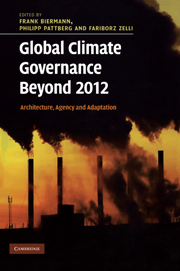Book contents
- Frontmatter
- Contents
- List of contributors
- Preface
- List of abbreviations
- 1 Global climate governance beyond 2012
- Part I Architecture
- Part II Agency
- Part III Adaptation
- 14 Global adaptation governance
- 15 Costs, benefits and interlinkages between adaptation and mitigation
- 16 Global adaptation governance
- 17 Global adaptation governance beyond 2012
- 18 Shaping future adaptation governance
- 19 Conclusions
- Index
- References
14 - Global adaptation governance
setting the stage
Published online by Cambridge University Press: 05 July 2014
- Frontmatter
- Contents
- List of contributors
- Preface
- List of abbreviations
- 1 Global climate governance beyond 2012
- Part I Architecture
- Part II Agency
- Part III Adaptation
- 14 Global adaptation governance
- 15 Costs, benefits and interlinkages between adaptation and mitigation
- 16 Global adaptation governance
- 17 Global adaptation governance beyond 2012
- 18 Shaping future adaptation governance
- 19 Conclusions
- Index
- References
Summary
Introduction
The Fourth Assessment Report of the Intergovernmental Panel on Climate Change has shown that past mitigation efforts have been too little and too late (IPCC 2007a). Climate change becomes a reality of world politics in the twenty-first century. This requires a new, additional focus in both academic research and policy planning. How can we build systems of global governance that will cope with the global impacts of climate change? What institutions are in need of redesign and strengthening? And to what extent, and in what areas, do we need to create new institutions and governance mechanisms?
These questions are at the centre of the third part of this book. While substantial research exists on local and national adaptation policies and institutions, the focus of this part is on global adaptation governance, an area that is still least explored. Global adaptation governance will affect most areas of world politics, including many core institutions and organizations. The need to adapt to climate change will influence, for example, the structure of global food regimes and the work of the UN Food and Agriculture Organization; global water regimes and the relevant organizations and programmes; global health governance and the agenda of the World Health Organization; global trade in goods whose production will be harmed or helped by climate change; the world economic system and the ability of the International Monetary Fund to address climate-related shocks to national and regional economies; and many other sectors from tourism to transportation, energy or even international security. Almost all areas of global governance will be challenged to cope with global warming and its impacts on human and natural systems. Yet not much research is available. In light of the most recent scientific findings, which indicate possibly accelerating climatic change, there is an urgent need for a new academic research programme on what we propose to call ‘global adaptation governance’.
- Type
- Chapter
- Information
- Global Climate Governance Beyond 2012Architecture, Agency and Adaptation, pp. 223 - 234Publisher: Cambridge University PressPrint publication year: 2010
References
- 3
- Cited by



